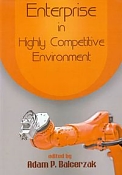| |||||
• polskie
• Zamów informacje o nowościach z wybranego tematu • kontakt |
ENTERPRISE IN HIGHLY COMPETITIVE ENVIRONMENTBALCERZAK A.wydawnictwo: UMK, 2012, wydanie Icena netto: Enterprise in Highly Competitive EnvironmentThe years 2008-2009 have been considered as the most difficult ones for most companies for many decades. The global financial crisis has influenced all economic players: multinational corporations such as the former biggest car producer General Motors, companies operating on the national markets, as well as small family enterprises or single entrepreneurs.As a result every manager or entrepreneur not only has had to take into consideration typical high competitive pressure of global economy but also has been forced to implement some remedies and adjustments to turbulent reality of the financial crisis. It means that whole business world has been focused on finding additional resources to survive the recession. In practice, at a time of recession companies tend to implement strategies and business solutions that are supposed to bring quick costs' reductions. Even though these immediate savings obtained during crises are usually necessary to survive, but still they are often only effective in very short term and can even sometimes become threat to a long term competitive potential of a company. It means that one of the most important skills of a good manager is the ability to keep long term perspective even when one needs to react to present problems. This is especially important in highly turbulent and competitive environment of contemporary global economy. As a result the idea and the aim of this book is to present some strategies and business solutions that can be an effective long term alternative to easily applicable, but only useful in the short term, obvious cost cuts and easy adjustments. Introduction (Adam P. Balcerzak) /7 Part I. Improving Competiveness of Enterprise Renata Koneczna, Sustainable Business Concepts and Th eir Impact on the
Increase of the Company's Competitive and Innovative Advantages /19 Part II. Knowledge and Human Capital in Building Innovative Potential of Enterprises Beata Michorowska, Knowledge Flows from Transnational Corporations to Local
Subsidiaries /153 Contributors /261 264 pages , Paperback
Po otrzymaniu zamówienia poinformujemy pocztą e-mail lub telefonicznie, |


